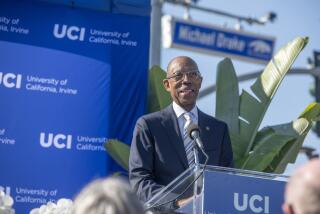James Cleary, 80; CSUN president guided school through an era of massive change
- Share via
James W. Cleary, former president of Cal State Northridge who led the institution through a period of unprecedented growth that transformed it from a sleepy, mostly white commuter school to a diverse and respected university, has died. He was 80.
Cleary, whose 23-year tenure as president was the longest in CSUN’s history, died Saturday at his home in Boise, Idaho. He had been in failing health for some time, according to his daughter Janet.
Founded in 1958, the university grew from 18,500 students in 1969 when Cleary arrived to more than 30,000 students and 90 degree programs when he retired in 1992. He watched the physical facilities grow from a handful of buildings to more than 50, including the campus’ landmark Oviatt Library.
Academically, he oversaw the creation of Pan-African studies and Chicano studies departments and established an exchange program with Chinese universities. He also established academic programs in India and other countries.
“It was important to me that CSUN not look provincial,” Cleary said some years ago. “I pushed hard for international attention. As a result, we developed continuing education, faculty sabbaticals and visiting professorships.
“I believe it was the right direction to take.”
The direction was markedly different from what Cleary encountered when he became president of the Northridge campus, then called San Fernando Valley State College, on June 16, 1969. Less than a year before his arrival, African American students and their supporters, alleging discrimination, took over the fifth floor of the administration building and held 34 college officials and employees for four hours. In the months after the incident, a protest fire was set in the administration building and a clash between police and students resulted in 286 arrests on campus.
Cleary was no stranger to student unrest. While he was a University of Wisconsin administrator in the fall of 1968, the National Guard occupied the Madison campus for 10 days during a strike by African American students.
“I have been asked countless times why I chose to jump from the frying pan into the fire,” Cleary said shortly after becoming president of the California institution. “My answer is that there are things wrong with higher education; why not seize the opportunity to solve them?”
Born April 16, 1927, in Milwaukee, Cleary received undergraduate and master’s degrees in the early 1950s from Marquette University there. In 1956, he earned a doctorate in communication and public address from the university. He later was a speech professor at the University of Wisconsin and from 1965 until 1969 was assistant chancellor and vice chancellor for academic affairs.
Across the country, San Fernando Valley State College was in turmoil. Its first major student demonstration came in the spring of 1967, after police surrounded a campus building where political pamphlets were being distributed.
Ralph Prator, who had served as the college’s first president, resigned in June 1968, and three administrators subsequently served as acting president. Cleary was the unanimous choice of the trustees, the State Colleges Senate and Chancellor Glenn S. Dumke, who described him in 1969 as “a man who can cope with the problems of our new society.”
In his first year at CSUN, Cleary gained a reputation for quickly responding to campus problems.
The day after a rock festival got out of hand, he formed a committee of residents and business leaders to advise on future bookings on campus.
Responding to complaints that some segments of the college population were going unnoticed, Cleary stepped up talks with various campus interest groups.
Except for minor student protests over the Vietnam War, the college campus was free of violence.
In June 1972, the college received its university designation, giving it the name California State University Northridge.
While at CSUN, Cleary also lobbied for the elevation of its athletics program to the National Collegiate Athletic Assn. Division I.
But in November 2001, university President Jolene Koester dropped the football program, which was costing the campus $1 million a year but only bringing in $26,000 in gate receipts.
And Cleary’s dream of developing 100 acres of CSUN’s north campus -- to include a hotel, stadium and student housing -- collapsed under harsh criticism from neighbors.
Cleary could be tough at times, such as in 1985 when he removed a respected longtime director of the university’s National Center on Deafness, saying new leadership was needed.
And in April 1988, when professors were accused of participating in a grade-selling scheme that benefited one of their nonprofit foundations, Cleary swiftly canceled three Pan-African field studies classes. Two Pan-African studies faculty members were later fired, though one was ultimately reinstated by a state board.
Other times, Cleary reacted more moderately to events, such as when he rejected a recommendation by the Faculty Senate in early 1990 to oust the university’s ROTC military training programs because the Pentagon excluded known homosexuals from the armed forces. At the time, Cleary said state university attorneys advised him that dropping ROTC could jeopardize federal funding for the college.
In addition to Janet, Cleary is survived by another daughter, Colleen; and two grandchildren, Meghan Rauker and Anne Marie Rauker.
His wife, Mary, died in 2002. Their daughter Patricia died in 2000.
A funeral Mass and memorial service is scheduled for Wednesday, May 16, at St. John’s Cathedral in Boise, Idaho.
More to Read
Sign up for Essential California
The most important California stories and recommendations in your inbox every morning.
You may occasionally receive promotional content from the Los Angeles Times.













